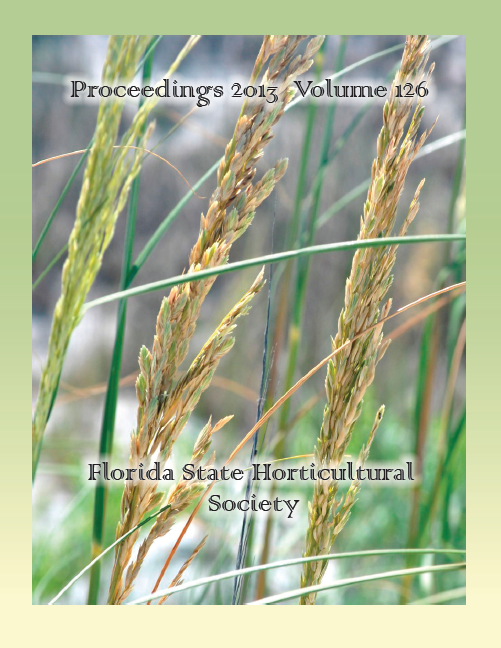Control of Asian Citrus Psyllid and Citrus Leafminer in Oranges with Foliar Sprays of Horticultural Mineral Oil, Microbial and Synthetic Insecticides
Published 2013-12-01
Keywords
- Burkholderiaspp.,
- chemical control,
- Citrus sinensis,
- citrus greening disease,
- Chromobacterium substugae
- Diaphorina citri,
- huanglongbing,
- Phyllocnistis citrella ...More
Abstract
Control of the Asian citrus psyllid Diaphorina citriKuwayama and citrus leafminer Phyllocnistis citrellaStainton in Florida and elsewhere is critical to reduce huanglongbing and citrus canker diseases, respectively. Sprays of horticultural
mineral oil (HMO) with or without microbial or synthetic insecticides were evaluated in 3-year-old blocks of orange trees, Citrus sinensis(L.) Osbeck ‘Hamlin’ infested with both pests. HMO (2% v/v) alone or with microbial insecticides, Grandevo and experimental MBI-206 applied twice (14 days apart), or the synthetic Delegate applied once significantly suppressed leafminer and psyllid through 22 and 28 days after first application, respectively. HMO plus MBI 206 and Delegate reduced psyllids below a threshold of 0.2 adults per tap sample through 2 and 7 days after first application, respectively. Pest reduction from oil applied alone was not different when microbials were applied with oil. Synthetic insecticides provided more psyllid reduction than microbials or HMO and reduced leafminer for up to 17 days. New products tested and in the registration process for use on citrus will extend the range of tools available to control these pests. While the effectiveness of microbial and oil sprays tended to be short lived, they could still be useful to conserve natural enemies, for application on blooming citrus and in organic groves that prohibit synthetic products.

